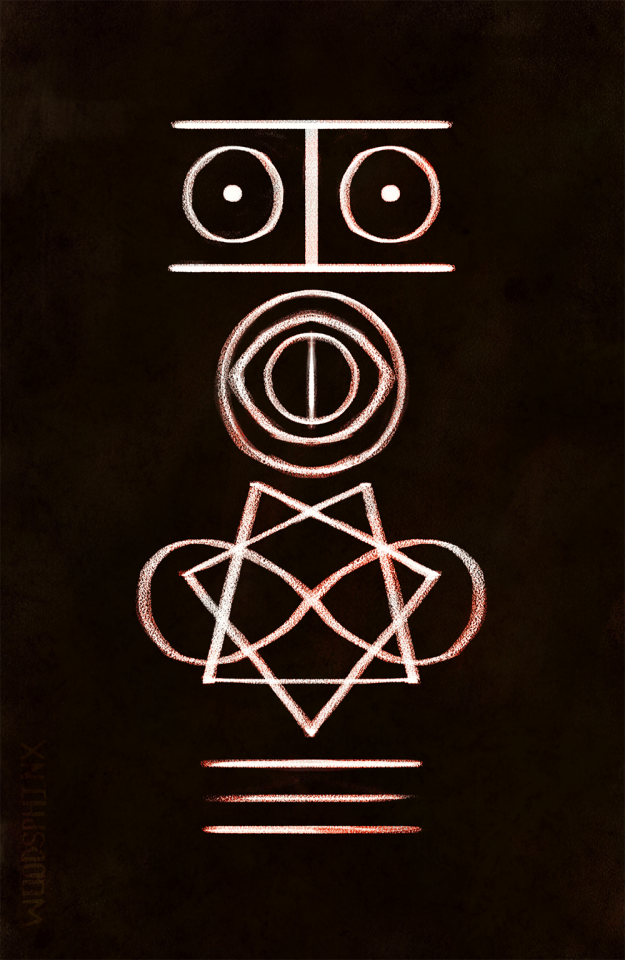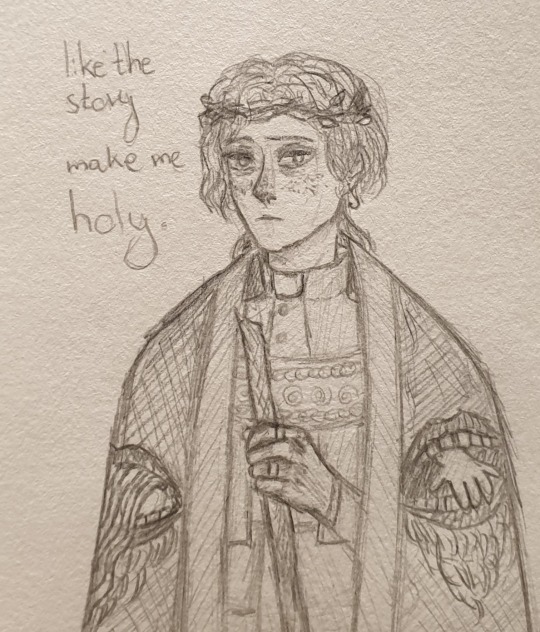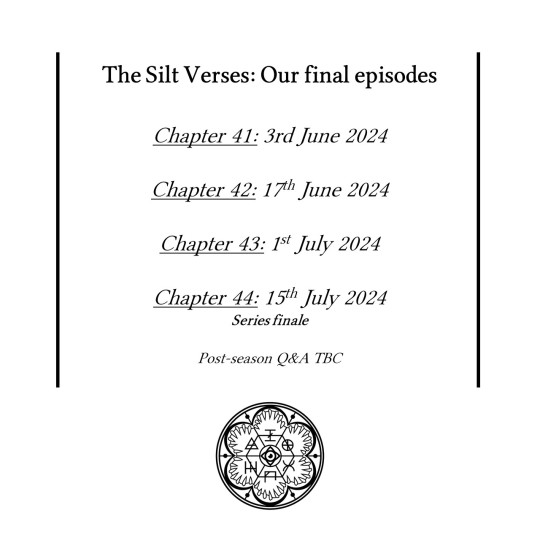#the silt verses chapter 43
Explore tagged Tumblr posts
Text

#they updated the transcript…#fuck man#the silt verses#the silt verses spoilers#tsv#tsv spoilers#brother Faulkner#the silt verses chapter 43
283 notes
·
View notes
Text
KILL YOUR GODS
#WHAT A FUCKING BANGER OF A LINE#adjudicator shrue#the silt verses#tsv podcast#the silt verses chapter 43#the silt verses spoilers
41 notes
·
View notes
Text

Delicious.
12 notes
·
View notes
Text

These are the marks of the Many Below.
Use them, pass them on, do not forget the suffering that keeps the engines of this world turning..
#wanted to try drawing em while i listened#the silt verses#the many below#the silt verses fanart#my art#tsv chapter 43
681 notes
·
View notes
Text
happy crab 9/11
#the silt verses#tsv#set in chapter 43#ranefall#kinda sorta very much#yes im still trapped in the ranefall mines please tell my family i love them#madwoman’s scribblings
69 notes
·
View notes
Text

for when the bell rings, brother, you're on your own
#the silt verses#the silt verses spoilers#brother faulkner#faulkner tsv#still not over chapter 43#so not over
109 notes
·
View notes
Text
it pleases me greatly that faulkner’s wet footsteps in this most recent episode sound like squidward walking
28 notes
·
View notes
Text
"all of this because one brat thought he was special?"
19 notes
·
View notes
Text
Yeag.
Sibling Rane when i catch you sibling rane. I'll probably just give you a stern talking to cos i dont think you're a bad person but when i fucking catch you sibling rane
23 notes
·
View notes
Text
This is how it ends.
Here's our final The Silt Verses release schedule, in full:

Chapter 41 (But As My Last Breath Splits My Throat) 3rd June 2024
Chapter 42: 17th June 2024
Chapter 43: 1st July 2024
Chapter 44 (Series finale): 15th July 2024
Post-season Q&A - will be recorded in August / September and released after that. Exact timings to be confirmed depending on exhaustion, screaming newborn, etc, hopefully with the wonderful Méabh de Brún as our final host. (We'll share it around more post-season, but if you want to get your questions in early, please feel free!)
Can't wait to share the final episodes with you all, and as ever, thanks so much for listening.
860 notes
·
View notes
Text



Begin with a balbis on its side. Within the two spaces, a circle marked by a single dot.
Beneath this, a pair of concentric circles. Within the annulus, an ovoid with a slit - a staring eye.
Under that, a lemniscate over a heptagram, and three parallel lines beneath.
These are the marks of the Many Below.
The Silt Verses, Chapter 43
Based on this post by @ignitingthesky
#the silt verses#the many below#embroidery#tsv#these photos came out terribly#but I'm pleased with how it looks irl#I'm going to put the withermark on the other sleeve
226 notes
·
View notes
Text
Diversity win the people that gave the command to nuke your city are trans masc and non binary!
#the silt verses#the silt verses spoilers#sibling rane#brother Faulkner#the silt verses chapter 43#tsv#ranefall
67 notes
·
View notes
Text
despite the trauma of that episode, this still makes me laugh

38 notes
·
View notes
Text

Begin with a balbis on its side. Within the two spaces, a circle marked by a single dot.
Beneath this, a pair of concentric circles. Within the annulus, an ovoid with a slit - a staring eye.
Under that, a lemniscate over a heptagram, and three parallel lines beneath.
These are the marks of the Many Below.
The Silt Verses, Chapter 43
#ignitedart#the silt verses#tsv#tsv spoilers#the silt verses spoilers#i'm not totally sure i interpreted the marks correctly please let me know if there are inaccuracies
251 notes
·
View notes
Text
The Silt Verse Chapter 43

The Silt Verses Finale Part 2

101 notes
·
View notes
Text
Shrue’s descent into radicalism and what the Silt Verses says about our world today
(also, regarding the giant poem that the episode titles make) ITS A TUMBLR ESSAY BABYYYYYYYYY
Kill your gods. Starve them out, topple their statues, forsake their comfort— Kill the stories that gave birth to them. Tear away your flesh that bears their marks. Adjudicator Shrue, Ep. 43
The Silt Verses is a story born of its time, to a 21st century world which is slowly decaying—and everyone in it is doing their part to help it decay just a little bit faster. It speaks of capitalism, of corruption, of power and belief and environmental destruction and the rift between generations. When Charles tells Val he can’t really stand behind the idea of a family (“You wonder about what kind of world we’re bringing children into, y’know?”) I had to pause and gather myself; it’s something we hear from so many Gen Z’ers today.
But then Shrue’s speech came, and it made no sense.
Shrue calls for an end in any form it can be given. They call for the loss of all faith and love and community in the world; they call for us to kill the stories of our history, to kill the figures we believe in and the ones that give us hope. Anything, everything, all we can give to stop the decay and degradation of the world. They demand us to defeat the corrupt system we have built by trading our lives to do so.
If our words and stories sustain them, let us fall silent. If our communities rely on them, let us drift apart and die, lonely, in the polluted wilds amongst the howling winds of long forgotten deities.
It made no sense because TSV, most simplistically, embodies “no ethical consumption under capitalism”—and this solidly did not fit. So I cast about for an answer to what it all meant, because TSV had grown to be more than the “folks, look where capitalism got us” which I thought it to be. And Shrue's “we can’t do anything to escape the system but die” was just too flat a conclusion.
Then I fell upon the poem compiled from each episode’s title.
It begins with the start of humanity: a story of things that have happened, things people have believed, things which have roamed the land from then til now.
Let me speak first of revelations, and next of dark deceit. Then I’ll speak of champions, of lovers, gods and beasts.
And so the poem continues in a description of this story, until it eventually twists to become entirely self-destructive around Chapters 18-24. It's a reference to how everything in the TSV universe seems to eat itself: their system of gods, sacrifices, even the characters themselves.
If I could trace with bloodless fingers, if my hands could shape the flow, I’d bear this song to the precipice and rend us both to dust below. We’d both go plunging downwards, one final fall from grace— I’d howl, I’d scream, in victory, and we’d be gone without a trace.
At Chapter 25, we get a respite from the story. We get a short poetic break which concludes that yes, we’re doomed to die—but we continue as we are despite it, and write our story even if it’ll be lost in the end. It’s a classic conclusion that a lot of literature and poetry fall to, because it’s so very human. It’s a cliche, and it’s a cliche for a reason.
But we’ll never be rid of each other, my song, my sorrow, and I, So I’ll bear it trembling onwards: to drift on, to dream, to die.
With that, the poem progresses forward until it starts addressing our end and what happens when we face that. It screams of last-ditch efforts keep on believing, even as we plunge down and down and the world just gets worse and worse. Shrue’s speech takes place in “One Last Song of Revelations” (the title is so fitting!), where they vocalize their realization that their pacifist attitude isn’t doing shit to change anything.
But when they switch towards radicalism because it’s, evidently, the only way anything will ever get done—the only way anything will get the exposure to maybe make an impact—they speak of the destruction of society as a whole. Not the eradication of capitalism, nor the installation of kinder gods, nor the lowering of sacrifice ceilings. They speak of true destruction. Utter destruction.
Shrue’s speech isn’t some call to action, nor does it embody any concrete ideology which the writers are trying to convey. It’s just an expression of desperation. Nothing is working; no one is listening.
What this poem sounds like is a story of how our world goes. It's its birth, its self-destruction, its philosophical revelations, its finale.
When we began following Carpenter and Faulkner in the reeds of the White Gull River, we were consuming a commentary on capitalism. Now, it’s more. It’s a commentary, yes, but it’s not only that—it’s an exploration. The Silt Verses is a tragic exploration of our world as it connects to theirs, of how we’ve been driven so far and been corrupted so deeply that only radicalism makes a difference because only radicalism is what gets the notice and attention to spark moderate change. And that same radicalism is going to destroy the society we have left.
But it’s all the same in the end, because society's collapse was going to happen anyways. So at least someone had it in them to fight for something.
GAHHHH I LOVE THIS SHOW
64 notes
·
View notes